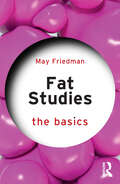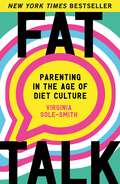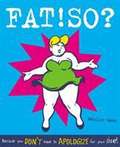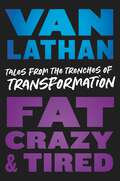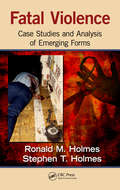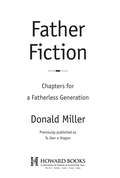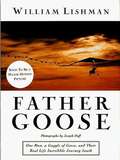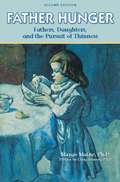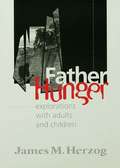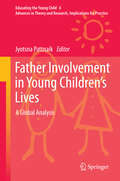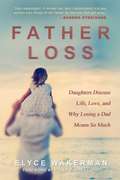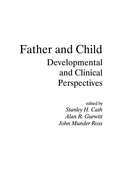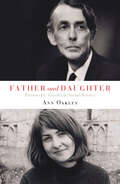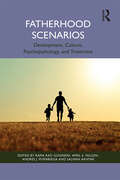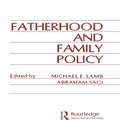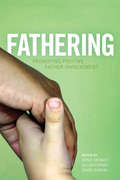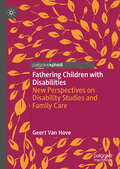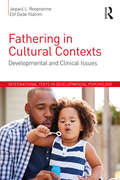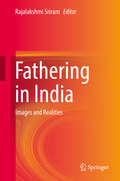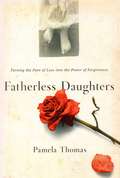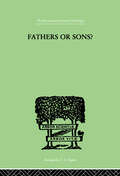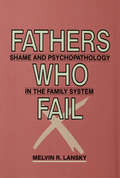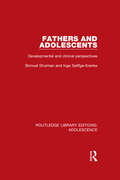- Table View
- List View
Fat Studies: The Basics (The Basics)
by May FriedmanFat Studies: The Basics introduces the reading of fat bodies and the ways that Fat Studies, as a field, has responded to waves of ideas about fat people, their lives, and choices.Part civil rights discourse and part academic discipline, Fat Studies is a dynamic project that involves contradiction and discussion. In order to understand this field, the book also explores its intersections with race, class, gender, sexuality, age, disability, ethnicity, migration and beyond. In addition to thinking through terminology and history, this book will aim to unpack three key myths which often guide Fat Studies, showing that: fat is a meaningful site of oppression intersected with other forms of discrimination and hatred to be fat is not a choice (but also that a discussion of choice is itself problematic); and fat cannot be unambiguously correlated with a lack of health Fat Studies: The Basics is a lively and accessible foundation for students of Gender Studies, Sociology, Psychology, and Media Studies, as well as anyone interested in learning more about this emergent field.
Fat Talk: Parenting in the Age of Diet Culture
by Virginia Sole-SmithNEW YORK TIMES BESTSELLERA Book Riot best book of 2023A Science Friday best book of 2023An Audible best well-being audiobook of 2023By the time they reach kindergarten, most kids believe that “fat” is bad. By middle school, more than a quarter of them have gone on a diet. What are parents supposed to do?Kids learn, as we’ve all learned, that thinness is a survival strategy in a world that equates body size and value. Parents worry if their kids care too much about being thin, but even more about the consequences if they aren’t. And multibillion-dollar industries thrive on this fear of fatness. We’ve fought the “war on obesity” for over forty years and Americans aren’t thinner or happier with their bodies. But it’s not our kids—or their weight—who need fixing.In this illuminating narrative, journalist Virginia Sole-Smith exposes the daily onslaught of fatphobia and body shaming that kids face from school, sports, doctors, diet culture, and parents themselves—and offers strategies for how families can change the conversation around weight, health, and self-worth.Fat Talk is a stirring, deeply researched, and groundbreaking book that will help parents learn to reckon with their own body biases, identify diet culture, and empower their kids to navigate this challenging landscape. Sole-Smith draws on her extensive reporting and interviews with dozens of parents and kids to offer a provocative new approach for thinking about food and bodies, and a way for us all to work toward a more weight-inclusive world.
Fat! So?: Because You Don't Have To Apologize For Your Size
by Marilyn WannFat? Chunky? Less than svelte? So what! <P><P>In this hilarious and eye-opening book, fat and proud activist/zinester Marilyn Wann takes on Americas' biggest fear--worse than the fear of public speaking or nuclear weapons--our fear of fat.Statistics tell us that about a third of Americans are fat, and common sense adds that just about everyone, fat or thin, male or female, has worried about their appearance. <P><P>FAT!SO? weighs in with a more attractive alternative: feeling good about yourself at any weight--and having the style and attitude to back it up. Internationally recognized as a fat-positive spokesperson, Wann has learned that you can be absolutely happy, healthy, and successful...and fat. <P><P>With its hilarious and insightful blend of essays, quizzes, facts, and reporting, FAT!SO? proves that you can be out-and-out fabulous at any size.
Fat, Crazy, and Tired: Tales from the Trenches of Transformation
by Van Lathan Jr.Podcaster and former TMZ host Van Lathan Jr. writes a sharp, funny, and brutally honest, cultural critique of the unspoken obstacles and extreme anxiety that keep us from maintaining good health in America&’s &“wellness waistland,&” explored through vignettes about his mental health and weight loss journey as a Black man. A formerly chubby kid who self‑identified for much of his life as &“the fat friend,&” media personality and podcast host Van Lathan Jr. has struggled with physical and mental health his entire life. He was used to being his besties' wing man on the dating scene, the slack bench‑dweller at the gym, and his mother's biggest fan at every meal, especially whenever she served up her infamous mac and cheese with five different kinds of cheese. At 365 lbs, Van hated being fat so much, he found it harder than being Black! After dedicating years to improving his physical and mental health, with many ups and downs, in 2020 Van found himself in a shared slump with other Americans when the Covid-19 pandemic hit and the George Floyd video was released—suddenly he was surrounded by carbs galore, binge-ing everything, feeling non‑stop exhaustion, and crippling waves of anxiety and depression. Fat, Crazy, and Tired isn't just about Van's ultimately unsuccessful journey to an Instagram‑able body and zen; it's about the unspoken personal battlefield of attaining and maintaining what Americans deem as good health. He explores the real reasons behind our unending physical and mental health battles—culture, family, and the baggage of life—and demonstrates how we can better understand our bodies by better understanding ourselves. He takes it back to his southern upbringing in Baton Rouge, opens up about how being &“the Black guy&” at work at TMZ overshadowed his identity, and shares how he holds up to survive the madness.&“Detox&” cleanses? Weight loss pills? Celery juice? No, thank you. Unlike the self‑help gurus that push you to go &“all or nothing&” and &“keep it 100,&” Van wants you to be happier and healthier at 50% without totally admonishing yourself to get there. Packed with double doses of humor Fat, Crazy, and Tired shares abrutally honest cultural critique of mental health and our weight loss obsession in what he dubs America&’s &“wellness waistland.&”
Fatal Violence: Case Studies and Analysis of Emerging Forms
by Ronald M. Holmes Stephen T. HolmesFrom serial murderers to parents who kill, Fatal Violence: Case Studies and Analysis of Emerging Forms provides an insider‘s look at a phenomenon that has existed since the dawn of man and cuts across social/economic barriers and cultures. Offering a rare glimpse into the minds of predators and containing chilling details of motives and methods, th
Father Fiction
by Donald L. MillerCHAPTERS FOR A FATHERLESS GENERATIONWith honest humor and raw self-revelation, bestselling author Donald Miller tells the story of growing up without a father and openly talks about the issues that befall the fatherless generation. Raw and candid, Miller moves from self-pity and brokenness to hope and strength, highlighting a path for millions who are floundering in an age without positive male role models. Speaking to both men and women who grew up without a father--whether that father was physically absent or just emotionally aloof--this story of longing and ultimate hope will be a source of strength. Single moms and those whose spouses grew up in fatherless homes will find new understanding of those they love as they travel along this literary journey. This is a story of hope and promise. And if you let it, Donald Miller's journey will be an informal guide to pulling the rotted beams out from our foundations and replacing them with something upon which we can build our lives.
Father Fiction: Chapters for a Fatherless Generation
by Donald L. MillerWith honest humor and raw self-revelation, bestselling author Donald Miller tells the story of growing up without a father and openly talks about the issues that befall the fatherless generation. Raw and candid, Miller moves from self-pity and brokenness to hope and strength, highlighting a path for millions who are floundering in an age without positive male role models. Speaking to both men and women who grew up without a father--whether that father was physically absent or just emotionally aloof--this story of longing and ultimate hope will be a source of strength. Single moms and those whose spouses grew up in fatherless homes will find new understanding of those they love as they travel along this literary journey. This is a story of hope and promise. And if you let it, Donald Miller's journey will be an informal guide to pulling the rotted beams out from our foundations and replacing them with something upon which we can build our lives.
Father Goose: One Man, a Gaggle of Geese and Their Real Life Incredible Journey South
by William Lishman Joseph DuffFeatured on an enormously popular 20/20 segment, this heartwarming story tells of William Lishman, a reclusive sculptor, who adopted a gaggle of geese, flew with them in an ultralight glider, and actually taught them to migrate--earning himself the nickname "Father Goose. "
Father Hunger
by Craig Johnson Margo Maine"Father Hunger" is the emptiness experienced by women whose fathers were physically or emotionally absent-a void that leads to unrealistic body image, yo-yo dieting, food fears and disordered eating patterns. The term, which is now part of the psychology lexicon, originated with the first edition of this work in 1991. After having completed a decade's worth of further investigation, Dr. Maine has updated the information about men and their daughters in this second edition. She offers a new crash course on being a girl in today's culture, based on her expertise as a leading eating disorders prevention advocate. This edition describes the origins of father hunger and its effect on the family, with even more practical solutions to help fathers and daughters understand and improve their relationships. Also included is an expanded section for educators and therapists to help them more effectively prevent and treat the problems that occur between dads and daughters.
Father Hunger: Explorations with Adults and Children
by James HerzogJames M. Herzog's Father Hunger: Explorations with Adults and Children will quickly take its place both as a landmark contribution to developmental psychology and as an enduring classic in the clinical literature of psychoanalysis. We live in an era when a great many children grow up without a father, or, worse still, with fathers who traumatically abuse them. Yet, society continues to ignore the emotional price that children pay, and often continue to pay throughout their lives, for this tragic state of affairs. Father Hunger will change this situation. First drawn to his topic by observing the recurring nightmares of clinic-referred children of newly separated parents - nightmares in which the children's fear of their own aggression was coupled with desperate wishes for their fathers' return - Herzog went on to spend more than two decades exploring the role of the father in a variety of naturalistic settings. He discovered that the characteristically intense manner in which fathers engaged their children provided an experience of contained excitement that served as a necessary scaffolding to the children's emerging sense of self and as a potential buffer against future trauma. A brilliant observer and remarkably gifted, caring clinician, Herzog remains true to the ambiguities and multiple leves of meaning that arise in therapeutic encounters with real people. He consistently locates his therapeutic strategies and clinical discoveries within a sophisticated observational framework, thus making his formulations about father hunger and its remediation of immediate value to scientific researchers. A model of humane psychoanalytic exploration in response to a deepening social problem, Father Hunger is a clinical document destined to raise public consciousness and help shape social policy. And in the extraordinary stories of therapeutic struggle and restoration that emerge from its pages, it is a stunning testament to the resiliency of the human spirit.
Father Involvement in Young Children’s Lives
by Jyotsna PattnaikThis vital addition to Springer's 'Educating the Young Child' series addresses gaps in the literature on father involvement in the lives of young children, a topic with a fast-rising profile in today's world of female breadwinners and single-parent households. While the significant body of theoretical understanding and empirical data accumulated in recent decades has done much to characterize the fluidity of evolving notions of fatherhood, the impact of this understanding on policy and legal frameworks has been uneven at an international level. In a field where groups of fathers were until recently marginalized in research, this book adopts a refreshingly inclusive attitude, aiming to motivate researchers to capture the nuanced practices of fathers in minority groups such as those who are homeless, gay, imprisoned, raising a disabled child, or from ethnically distinct backgrounds, including Mexican- and African-American and indigenous fathers. The volume includes chapters highlighting the unique challenges and possibilities of father involvement in their children's early years of development. Contributing authors have integrated theories, research, policies, and programs on father involvement so as to attract readers with diverse interest and expertise, and material from selected countries in Asia, Australia, and Africa, as well as North America, evinces the international scope of their analysis. Their often interdisciplinary analyses draw, too, on historical and cultural legacies, even as they project a vision of the future in which fathers' involvement in their young children's lives develops alongside the changing political, economic and educational landscapes around the world.
Father Loss: Daughters Discuss Life, Love, and Why Losing a Dad Means So Much
by Elyce WakermanAs Elyce Wakerman found in the scores of interviews she conducted, the loss of a father-- through death, divorce, or abandonment--is the event that shapes a girl’s life and all her future relationships. "In my fantasy,” one woman commented, "he remains the perfect, all-giving man”--a difficult role for any other man to fill. Based partly on the author’s experience, partly on her in-depth interviews, and partly on a questionnaire she developed with psychologist Holly Barrett to which almost six hundred women responded, Father Loss provides the clearest portrait yet of a very special group of women. As a group, they express their insecurities ("Sometimes I wonder if I’ll ever be able to love a man totally . . . because that would mean I didn’t love my father anymore. ” --Leslie). Yet individually, many have become outstanding achievers, including Eleanor Roosevelt ("He dominated my life as long as he lived and was the love of my life for years after he died. ”), Helen Gurney Brown ("People in business, my bosses, I look to them all as fathers. ”), Barbara Streisand, Gloria Steinem, Geraldine Ferraro and many others. A bestseller when it was first published twenty-five years ago and now updated and revised, Father Loss gives information and insight to fatherless daughters, to widows and divorcees with daughters, and to every father who needs to understand the vital role he plays in his daughter’s life--as the first man she ever loves.
Father Therapy: How To Heal Your Father Issues So You Can Enjoy Your Life
by Doreen Virtue Msw Andrew KarpenkoWounds from primal relationships, such as those with mothers and fathers, run very deep. If your childhood involved an absent, addicted, or abusive father, you may have these “emotional ghosts”: Low self-esteem People-pleasing, approval-seeking, neediness, and codependency Wishing and praying that your dad would change into the father you believe he should be Feeling frequently angry, including repressed anger Choosing romantic partners who remind you of your dad Intimidation surrounding male authority figures In this insightful and compassionate book, former psychotherapist Doreen Virtue and practicing clinical social worker Andrew Karpenko present a range of self-healing techniques to empower you to counsel your inner wounded child so that you can deal with men as a healthy functioning adult. Whether you are a man or a woman, they help you to choose thriving, balanced relationships with the males in your life; open your heart to feeling safe receiving love; and reconnect with both divine feminine and masculine energies. All of your painful experiences have happened for a reason. There are parts of your psyche calling out for attention. Healing your father wounds will free you from lingering feelings of emptiness and patterns of dysfunction with men—to pursue your passion and life purpose unfettered by the past.
Father and Child: Developmental and Clinical Perspectives
by Stanley H. Cath, Alan R. Gurwitt and John Munder RossFirst published in 1982. Routledge is an imprint of Taylor & Francis, an informa company.
Father and Daughter: Patriarchy, Gender and Social Science
by Ann OakleyFather and daughter provides an unique ‘insider perspective’ on two key figures in twentieth-century British social science. Ann Oakley, a highly respected sociologist and best-selling writer, draws on her own life and that of her father, Richard Titmuss, a well-known policy analyst and defender of the welfare state, to offer an absorbing view of the connections between private lives and public work. Using an innovative mix of biography, autobiography, intellectual history, archives, and personal interviews, some of which have not been previously available to the public, she provides a compelling narrative about gender, patriarchy, methodology, and the politics of memory and identity. This fascinating analysis defies the usual social science publications to offer a truly distinctive account which will be of wide interest.
Fatherhood Scenarios: Development, Culture, Psychopathology, and Treatment
by Salman Akhtar April E. Fallon Andres J. Pumariega Rama Rao GogineniFatherhood Scenarios offers a wide range of perspectives, including different cultural and ethnic perspectives and chapters considering the role of the father throughout the lifespan, including experiences of gay fathers, adoptive fathers, and disabled fathers.With contributors from around the world representing diverse mental health disciplines, these chapters constitute a harmonious gestalt of knowledge, information, theory, and socio-clinical dimensions pertaining to fatherhood. The emphasis of all these sections is nonetheless the psychosocial tasks of fatherhood as it undergoes subtle and gradual transformation with the offspring’s growth through childhood and adolescence to full adulthood, including becoming a parent themselves. The book also traces the portrayal of fatherhood in popular media including television and movies keeping in mind their evolution and transformation over the past many decades.Spanning a vast terrain of psychosocial concern, Fatherhood Scenarios will be of great appeal to mental health professionals, psychotherapists, child psychiatrists, and family welfare workers in practice and in training.
Fatherhood and Family Policy
by MICHAEL E. LAMB and ABRAHAM SAGIFirst published in 1984. Routledge is an imprint of Taylor & Francis, an informa company.
Fathering
by Annie Devault Gilles Forget Diane DubeauIn the past few decades, researchers and practitioners have moved away from the idea of fatherhood as a single, monolithic concept. Examining the challenges of vulnerable fathers such as those in poverty or in prison, they have developed valuable new strategies for cultivating the positive involvement of fathers in the lives of their children.Drawing on the innovative work of Prospère, a Quebec organization that brought together fathers, university researchers, and health and social service practitioners, Fathering details innovative approaches that support positive father involvement. It provides numerous examples of strategies and interventions with fathers, lessons learned from these practices on how to better support vulnerable fathers and families, and in-depth information on ways of designing, implementing, evaluating, and disseminating the results of participatory action research (PAR) - a methodology which put fathers at the heart of the project's decision-making.
Fathering Children with Disabilities: New Perspectives on Disability Studies and Family Care
by Geert Van HoveThis book explores the often-forgotten role of fathers of children with disabilities. Bridging the gap between disability studies, family studies, and gender studies, it uncovers men's perspective on caring for children with disabilities and presents examples of famous fathers, such as general Charles de Gaulle, film director Dan Habib, and scholars Michael Bérubé and Phil Ferguson. Drawing on interviews with fathers of children with disabilities, the author explores what makes a father a 'good father' and presents fatherhood as an intense and dynamic journey of discovery, experienced together with the children, as a process of ‘becoming with’. The testimonies offer an insight into the lived experience of fathers and challenge the model of caring masculinity through a narrative approach, with the aim to answer burning questions: can we built research lines around the experiences of fathers? can we secure the father perspective within family research and within support services for families with children with disabilities? A must read for academics in social science, education, and medical fields.
Fathering in Cultural Contexts: Developmental and Clinical Issues (International Texts in Developmental Psychology)
by Jaipaul L Roopnarine Elif Dede YildirimHow do men think about fathering? How does this differ across different regions of the world? And what effect does this have on child development? Fathering in Cultural Contexts: Developmental and Clinical Issues answers these questions by considering a broad range of theoretical and conceptual models on fathering and childhood development, including attachment theory, developmental psychopathology, masculinity and parenting typologies. Roopnarine and Yildirim provide a comprehensive view of fatherhood and fathering in diverse cultural communities at various stages of economic development, including fathers’ involvement in different family structures, from two-parent heterosexual families to community fathering. This book’s interdisciplinary approach highlights the changing nature of fathering, drawing connections with child development and well-being, and evaluates the effectiveness of a range of father interventions. Fathering in Cultural Contexts will appeal to upper level undergraduate and graduate students in human development, psychology, sociology, anthropology, social work, and allied health disciplines, and professionals working with families and children in non-profit and social service agencies across the world.
Fathering in India: Images and Realities
by Rajalakshmi SriramThis book covers the underexplored subject of ‘fathering’ in India. It delves into the shared aspirations of men in India to nurture their children in sensitively attuned ways within the culturally prescriptive context that governs men’s roles as providers and caregivers. This work is based on over two decades of intensive research in India on how different groups construct and experience fatherhood and fathering under changing circumstances. It unmasks the heterogeneity that exists within fathering in India through conversations with fathers across diverse contexts—in privileged economic situations and those in difficult home and family circumstances, having children with disability, single-parent fathers and fathers in the military. A separate section discusses fathering daughters and shared parenting. Images and role models in fathering are brought alive through analysis of Hindi films, the media, children’s literature and classical literature. The conceptual analysis moves beyond the power and control dimensions commonly used to describe Indian men and fathers, to highlight their resilience, adaptability, positive involvement and developmental trajectories. This volume is for scholars, researchers and practitioners in developmental psychology, human development and family science, sociology, early childhood education and psychiatry, pediatrics, community medicine and allied fields.
Fatherless Daughters: Turning the Pain of Loss into the Power of Forgiveness
by Pamela ThomasA moving, elegantly written, and exhaustively researched account of what it means for a girl to lose a father to death or divorce—with advice for fatherless daughters on how to cope. &“People who lose their parents early in life are like fellow war veterans. As soon as they discover that they are talking to someone else who has lost a parent, they know they are speaking the same language without uttering a word.&” Pamela Thomas gives voice to this unspoken pain in Fatherless Daughters. Still haunted by her own father&’s death when she was ten, Thomas decided to explore its effects. Though her journey began as a personal one, she soon felt the need to hear from other women and ended up interviewing more than one hundred fatherless women. They ranged in age from nineteen to ninety-four; they came from all areas of the country as well as Europe and Asia; some had lost their fathers to death, others to divorce or abandonment. Each account was unique, but the impact of a father&’s loss was profound in every woman&’s life. Thomas begins by defining what it means to be a father in our world. She discusses the initial shock of his loss, exploring the aspects that color how a young girl experiences it: her age at the time of her father&’s death or abandonment, her mother&’s behavior and attitudes, her place in the family vis-à-vis siblings, and the influence of a stepfather or father-surrogates. Thomas shows how a father&’s early death or abandonment affects a woman&’s emotional health and self-esteem, her body image, her sexual experiences, her marriage, her family life, and her career. Perhaps most important, Thomas offers compassionate advice for coming to terms with father loss, even late in life, from actively mourning, to healing, to starting fresh.
Fathers Or Sons?: A STUDY IN SOCIAL PSYCHOLOGY
by Hopkins, PrynceFirst Published in 1999. Routledge is an imprint of Taylor & Francis, an informa company.
Fathers Who Fail: Shame and Psychopathology in the Family System
by Melvin R. LanskyDespite the burgeoning literature on the role of the father in child development and on fathering as a developmental stage, surprisingly little has been written about the psychiatrically impaired father. In Fathers Who Fail, Melvin Lansky remedies this glaring lacuna in the literature. Drawing on contemporary psychoanalysis, family systems theory, and the sociology of conflict, he delineates the spectrum of psychopathological predicaments that undermine the ability of the father to be a father. Out of his sensitive integration of the intrapsychic and intrafamilial contexts of paternal failure emerges a richly textured portrait of psychiatrically impaired fathers, of fathers who fail. Lansky's probing discussion of narcissistic equilibrium in the family system enables him to chart the natural history common to the symptomatic impulsive actions of impaired fathers. He then considers specific manifestations of paternal dysfunction within this shared framework of heightened familial conflict and the failure of intrafamilial defenses to common shame. Domestic violence, suicide, the intensification of trauma, posttraumatic nightmares, catastrophic reactions in organic brain syndrome, and the murder of a spouse are among the major "symptoms" that he explores. In each instance, Lansky carefully sketches the progression of vulnerability and turbulence from the father's personality, to the family system, and thence to the symptomatic eruption in question. In his concluding chapter, he comments tellingly on the unconscious obstacles - on the part of both patients and therapists - to treating impaired fathers. The obstacles cut across different clinical modalities, underscoring the need for multimodal responses to fathers who fail.
Fathers and Adolescents: Developmental and Clinical Perspectives (Routledge Library Editions: Adolescence #9)
by Inge Seiffge-Krenke Shmuel ShulmanThe understanding and study of fathers has traditionally assumed that fathers, compared to mothers, are less involved with their children. Originally published in 1997 Fathers and Adolescents presents a different approach that focuses on the distinctive role of fathers in the lives of their adolescents, especially in their role in adolescents’ attainment of developmental tasks. Drawing on a variety of disciplines, the authors’ examine the relationships of fathers to their adolescents in the context of a changing society. They find that fathers interact in ways that are different from those of mothers, but that are important for both normal and disturbed adolescent development. Psychopathological, aggressive and incestuous behaviour is considered as well as the role of the father in more ideal circumstances. Drawing on the authors’ wealth of clinical experience, this title will still be an important resource for all professionals working with adolescents, as well as those in research.
